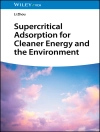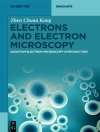In this handbook and ready reference, editors and authors from academia and industry share their in-depth knowledge of known and novel materials, devices and technologies with the reader. The result is a comprehensive overview of electrochemical energy and conversion methods, including batteries, fuel cells, supercapacitors, hydrogen generation and storage as well as solar energy conversion. Each chapter addresses electrochemical processes, materials, components, degradation mechanisms, device assembly and manufacturing, while also discussing the challenges and perspectives for each energy storage device in question. In addition, two introductory chapters acquaint readers with the fundamentals of energy storage and conversion, and with the general engineering aspects of electrochemical devices.
With its uniformly structured, self-contained chapters, this is ideal reading for entrants to the field as well as experienced researchers.
Table of Content
Volume 1
ELECTROCHEMICAL TECHNOLOGIES FOR ENERGY STORAGE AND CONVERSION
Introduction
Global Energy Status: Demands, Challenges, and Future Perspectives
Driving Forces behind Clean and Sustainable Energy Sources
Green and Sustainable Energy Sources and Their Conversion: Hydro, Biomass, Wind, Solar, Geothermal, and Biofuel
Electrochemistry: a Technological Overview
Electrochemical Rechargeable Batteries and Supercapacitors (Li Ion Batteries, Lead-Acid Batteries, Ni MH Batteries, Zinc-Air Batteries, Liquid Redox Batteries)
Light Fuel Generation and Storage: Water Electrolysis, Chloro-Alkaline Electrolysis, Photoelectrochemical and Photocatalytic H2 Generation, and Electroreduction of CO2
Fuel Cells: Fundamentals to Systems (Phosphoric Acid Fuel Cells, PEM Fuel Cells, Direct Methanol Fuel Cells, Molten Carbon Fuel Cells, and Solid Oxide Fuel Cells)
Summary
ELECTROCHEMICAL ENGINEERING FUNDAMENTALS
Electrical Current/Voltage, Faraday?s Laws, Electric Efficiency, and Mass Balance
Electrode Potentials and Electrode-Electrolyte Interfaces
Electrode Kinetics (Charger Transfer (Butler-Volmer Equation) and Mass Transfer (Diffusion Laws))
Porous Electrode Theory (Kinetic and Diffusion)
Structure, Design, and Fabrication of Electrochemical Devices
Nanomaterials in Electrochemical Applications
LITHIUM ION RECHARGEABLE BATTERIES
Introduction
Main Types and Structures of Li Ion Rechargeable Batteries
Electrochemical Processes in Li Ion Rechargeable Batteries
Battery Components (Anode, Cathode, Separator, Endplates, and Current Collector)
Assembly, Stacking, and Manufacturing of Li Ion Rechargeable Batteries
Li Ion Battery Performance, Testing, and Diagnosis
Degradation Mechanisms and Mitigation Strategies
Current and Potential Applications of Secondary Li Ion Batteries
LEAD-ACID BATTERY
General Characteristics and Chemical/Electrochemical Processes in a Lead-Acid Battery
Battery Components (Anode, Cathode, Separator, Endplates (Current Collector), and Sealing)
Main Types and Structures of Lead-Acid Batteries
Charging Lead-Acid Battery
Maintenance and Failure Mode of a Lead-Acid Battery
Advanced Lead-Acid Battery Technology
Lead-Acid Battery Market
NICKEL-METAL HYDRIDE (Ni-MH) RECHARGEABLE BATTERIES
Introduction to Ni MH Rechargeable Batteries
Electrochemical Processes in Rechargeable Ni-MH Batteries
Battery Components
Assembly, Stacking, Configuration, and Manufacturing of Rechargeable Ni-MH Batteries
Ni-MH Battery Performance, Testing, and Diagnosis
Degradation Mechanisms and Mitigation Strategies
Applications (Portable, Backup Power, and Transportation)
Challenges and Perspectives of Ni-MH Rechargeable Batteries
METAL-AIR TECHNOLOGY
Metal-Air Technology
Introduction to Aluminum-Air Technology
Introduction to Lithium-Air Technology
Introduction to Zinc-Air Technology
Introduction to Magnesium-Air Technology
Structure of Magnesium-Air Cell
Components
Manufacturing
Magnesium-Air Battery Performance
Degradation Mechanisms and Mitigation Strategies
Applications
Challenges and Perspectives of Magnesium-Air Cells
LIQUID REDOX RECHARGEABLE BATTERIES
Introduction
Electrochemical Processes in a Redox Flow Battery
Materials and Properties of Redox Flow Battery
Redox Flow Battery System
Performance Evaluation of Redox Flow Battery
Degradation Mechanisms and Mitigation Strategies
Applications of Redox Flow Batteries
Perspectives and Challenges of RFB
ELECTROCHEMICAL SUPERCAPACITORS
Introduction to Supercapacitors (Current Technology State and Literature Review)
Main Types and Structures of Supercapacitors
Physical/Electrochemical Processes in Supercapacitors
Supercapacitor Components
Assembly and Manufacturing of Supercapacitors
Supercapacitors Stacking and Systems
Supercapacitor Performance, Testing, and Diagnosis
Supercapacitor Configurations
Applications
Challenges and Perspectives of Electrochemical Supercapacitors
Volume 2
WATER ELECTROLYSIS FOR HYDROGEN GENERATION
Introduction to Water Electrolysis
Thermodynamics
Kinetics
Alkaline Water Electrolysis
PEM Water Electrolysis
High Temperature Water Electrolysis
Conclusion
HYDROGEN COMPRESSION, PURIFICATION, AND STORAGE
Introduction
Pressurized Water Electrolysis
Hydrogen Electrochemical Compression
Hydrogen Electrochemical Extraction and Purification
Hydrogen Storage in Hydride-Forming Materials
Conclusion and Perspectives
SOLAR CELL AS AN ENERGY HARVESTING DEVICE
Introduction
Solar Radiation and Absorption
Fundamentals of Solar Cells
Silicon Solar Cell
Other High-Efficiency Solar Cells
Dye-Sensitized Solar Cell
Routes to Boost the Efficiency of Solar Cells
Current Ideas for Future Solar Cell
Summary
PHOTOELECTROCHEMICAL CELLS FOR HYDROGEN GENERATION
Introduction
Main Types and Structures of Photoelectrochemical Cells
Electrochemical Processes in Photoelectrochemical Cells
Photoelectrochemical Cell Components
Assembly of Photoelectrochemical Cells
Photoelectrochemical Cell Performance, Testing, and Diagnosis
Degradation Mechanisms and Mitigation Strategies
Applications (Portable, Stationary, and Transportation)
Conclusions
POLYMER ELECTROLYTE MEMBRANE FUEL cells
Introduction to PEMFCs
Main Types and Structures of PEMFCs
Electrochemical Processes in PEMFCs
PEMFCs Components
Assembly and Manufacture of PEMFCs
PEMFC Stacking and System
PEM Performance, Testing, and Diagnosis
Degradation Mechanisms and Mitigation Strategies
Applications
Challenges and Perspectives
SOLID OXIDE FUEL CELLS
Introduction
Fuel Cell Components
Assembly and Manufacturing
Stacking and Balance of the Plant
Performance, Testing, and Diagnosis
Degradation Mechanisms and Mitigation Strategies
Applications
Challenges and Perspectives
DIRECT METHANOL FUEL CELLS
Introduction to Direct Methanol Fuel Cells
Main Types and Structures of Direct Methanol Fuel Cells
Electrochemical Processes in Direct Methanol Fuel Cells
Fuel Cell Components
Assembly and Manufacturing of Direct Methanol Fuel Cells
Direct Methanol Fuel Cell Stacking and Systems
Direct Methanol Fuel Cells: Performance, Testing, and Diagnosis
Degradation Mechanisms and Mitigation Strategies
Applications
Challenges and Perspectives of Direct Methanol Fuel Cells
MOLTEN CARBONATE FUEL CELLS
Introduction to Molten Carbonate Fuel Cells
Current Technologic Status of Molten Carbonate Fuel Cells
Electrochemical Processes in Molten Carbonate Fuel Cells
Components of Molten Carbonate Fuel Cells
Structure and Performance of MCFCs
Schematic of MCFC Power Generation Systems
Fabrication and Operation of MCFCs
MCFC Power Plant
Major Factors Affecting the Performance and Lifetime of MCFCs
Challenges and Perspectives of MCFCs
About the author
Lei Zhang is a Research Council Officer at the National Research Council of Canada Institute for Fuel Cell Innovation. She received her first M.Sc. in inorganic chemistry from Wuhan University in 1993, and her second in materials chemistry from Simon Fraser University, Canada in 2000. She is an adjunct professor at the Federal University of Maranhao, Brazil and at the Zhengzhou University, China, in addition to being an international advisory member of 7th IUPAC International Conference on Novel Materials and their Synthesis and an active member of the Electrochemical Society and the International Society of Electrochemistry. Ms. Zhang has co-authored over 90 publications and holds five US patent applications. Her main research interests include PEM fuel cell electrocatalysis, catalyst layer/electrode structure, metal-air batteries/fuel cells and supercapacitors.
Ru-Shi Liu received his bachelor?s degree in chemistry from Shoochow University, Taiwan, in 1981, and his master’s in nuclear science from the National Tsing Hua University, two years later. He gained one Ph.D. in chemistry from National Tsing Hua University in 1990, and one from the University of Cambridge in 1992. From 1983 to 1995 he worked as a researcher at the Industrial Technology Research Institute, before joining the Department of Chemistry at the National Taiwan University in 1995 where he became a professor in 1999. He is a recipient of the Excellent Young Person Prize, Excellent Inventor Award (Argentine Medal) and Excellent Young Chemist Award. Professor Liu has over 350 publications in scientific international journals as well as more than 80 patents to his name.
Hansan Liu is a researcher at the Oak Ridge National Laboratory, US Department of Energy. He obtained his Ph.D. in electrochemistry from Xiamen University where he studied cathode materials for lithium ion batteries. After graduation, he worked at the Hong Kong Polytechnic University and the National Research Council Canada on electrophotocatalysis and fuel cell electrocatalysis, respectively. He is currently working on next generation high-energy density batteries at ORNL. Dr. Liu has 14 years of research experience in the field of electrochemical energy storage and conversion. His research interests mainly include battery and supercapacitor materials, fuel cell electrocatalysts, and synthesis and applications of high surface area materials. He has authored and co-authored over 70 publications, including 3 books, 4 book chapters and 3 patent applications relating to batteries and fuel cells. Dr. Liu is an active member of the Electrochemical Society and the International Society of Electrochemistry.
Xueliang (Andy) Sun holds a Canada Research Chair in the development of nanomaterials for clean energy, and is Associate Professor at the University of Western Ontario, Canada. He received his Ph.D. in materials chemistry in 1999 from the University of Manchester, UK, after which he worked as a postdoctoral fellow at the University of British Columbia, and as a research associate at l’Institut national de la recherche scientifique, Canada. He is the recipient of a number of awards, including the Early Researcher award, Canada Research Chair award and University Faculty Scholar award, and has authored or co-authored over 100 papers, 3 book chapters and 8 patents. Over the past decade, Dr. Sun has established a remarkable track record in nanoscience and nanotechnology for clean energy, mainly in the synthesis and structure control of one-dimensional nanomaterials, as well as their applications for fuel cells and Li ion batteries.
Currently a Senior Research Officer and PEM Catalysis Core Competency Leader at the National Research Council of Canada Institute for Fuel Cell Innovation, Jiujun Zhang received his B.Sc. and M.Sc. in electrochemistry from Beijing University, China, in 1982 and 1985, respectively, and his Ph.D. in electrochemistry from Wuhan University in 1988. After this, he took up a position as an associate professor at the Huazhong Normal University, and in 1990 carried out three terms of postdoctoral research at the California Institute of Technology, York University, and the University of British Columbia. Dr. Zhang holds several adjunct professorships, including one at the University of Waterloo and one at the University of British Columbia, and is an active member of The Electrochemical Society, the International Society of Electrochemistry, and the American Chemical Society. He has 240 publications and around 20 patents or patent publications to his name. Dr. Zhang has over 28 years of R&D experience in theoretical and applied electrochemistry, including over 14 years of R&D in fuel cell, and three years of experience in electrochemical sensor.












